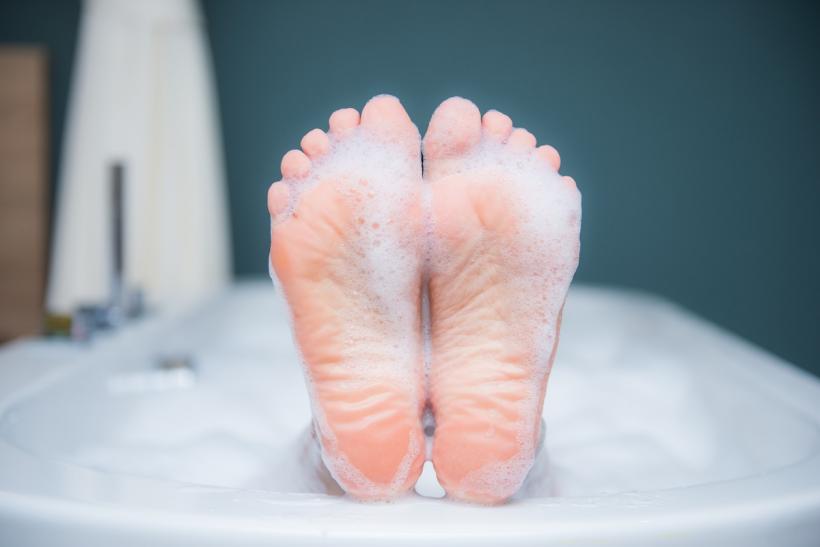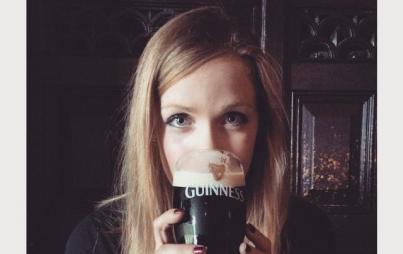
It’s taken me much longer to figure out how to simply eat in a way that feels right in my body, and to accept my body for what it is — broken, fat, and mine.
CN: weight loss
This article first appeared on Role Reboot and has been republished with permission.
I’ve always had a complicated relationship with my body — sometimes, it’s been too fat, sometimes it’s been too thin. But no matter how I look in a swimsuit in a given year, the one thing I can count on is that my body will be in poor health.
I’d like to say that having a variety of chronic health conditions since birth has made me less concerned about shallow, meaningless things like the size that’s written on the tags inside my clothes. But the truth is that often the size of my body has been the only part of my body that I can control. In a body that struggles to keep up with my mind, it’s been easy to find comfort in that control. I’ve spent years counting calories or carbs with the fervor of a religious zealot, glorying in my ability to bend my appetite to my will.
I know there are people who think it’s offensive to promote weight loss or diets. As someone who wasted many years trying to look better in my swimsuits, I agree — to a point. But I also know that no matter how much I may proclaim that size doesn’t matter, I feel better when I weigh less. I don’t have to be thin or even “normal” weight to feel better, but there is a point where I begin to feel the effects of excess weight and it only goes downhill from there. While I believe that there are people who can be healthy and fat, I am not one of them.
I will never be healthy no matter what I weigh, but it’s undeniable that my weight impacts my health.
It’s equally undeniable that my health impacts my ability to lose weight. A few years ago, I was diagnosed with mitochondrial disease, a progressive disorder of cellular energy production. Mitochondrial disease is a metabolic disorder, but not the way you might imagine — it is an error in the cellular metabolism, meaning that my cells struggle to produce energy and perform cellular metabolic functions.
Some people with mitochondrial disease end up very thin as a result of their disease; some people, like me, end up overweight. I can’t change my cells, and there’s no amount of dieting that will dramatically impact my weight. I’ve spent years restricting calories or carbs only to hit a brick wall at a certain size.
In the past, when I hit that same old wall, I would redouble my efforts to lose weight: I would restrict more; I would try carb cycling; I would spend hours in the gym each day; I would try eating more in case my metabolism needed a boost. But no matter what I did, I couldn’t get below that size. I couldn’t achieve a “normal” weight.
You Might Also Like: Whenever I Hate My Body, I Get Naked
I’m not sure why I wasted so many years trying to lose weight now except that the pull of cultural beauty standards is strong. I wanted, like most women, to be beautiful. I wanted to look good. And I was willing to do whatever it took to make that happen.
But I’m nearing 40 now, and my enthusiasm for rigid diets has waned. I no longer see an iron will when I limit my carbs or calories; I see missed opportunities to eat delicious food. So I’ve tried to relax my approach and follow my body’s lead, only to discover that my body isn’t a fan of carbs after all. Like it or not, I feel better following a low-carb diet — even though I’d love nothing more than to eat every carb in sight.
It’s taken me much longer to figure out how to simply eat in a way that feels right in my body, and to accept my body for what it is — broken, fat, and mine.
I’ve begun to make my peace with my health and with that has come a newfound peace with my body.
That doesn’t mean that I always love what I see in the mirror. If we’re being honest, I doubt anyone does. But how I look has come to be much less important to me than it once was. I wear clothes I enjoy and style my hair in a way I like, and I don’t worry much about how others will perceive me. For the first time in my life, I really just don’t give a fuck what strangers think about me.
My only regret is that I wasted nearly 40 years trying to bend my body to an imaginary idea of perfection. I didn’t appreciate it for what it was — and what it could once do that it no longer can — and I’m determined not to make that mistake again. I know what it feels like to lose health I once took for granted, and I’m committed to appreciating every last bit of what I’ve got. It’s not forever and it’s not guaranteed, and I know that better than a 39-year-old should.
Disability hasn’t been kind to me, and I see it in my droopy eyelids, missing fingers, and prematurely grey hair. But I’ve never missed those fingers much and I love my purple hair dye, and I’m not going to waste my body’s energy on hating myself anymore. What I will do instead is love my broken body enough to nurture it — instead of controlling it.








